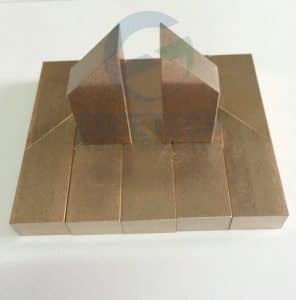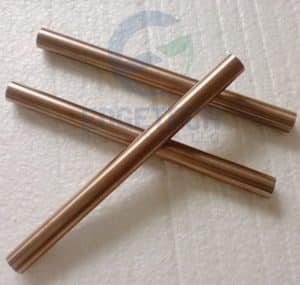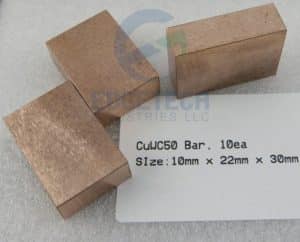Description
 Tungsten based composites (tungsten copper & tungsten silver) are strong refractory metal materials manufactured by a strictly controlled process involving pressing, sintering and infiltrating with copper or silver (tungsten copper & tungsten silver).
Tungsten based composites (tungsten copper & tungsten silver) are strong refractory metal materials manufactured by a strictly controlled process involving pressing, sintering and infiltrating with copper or silver (tungsten copper & tungsten silver).
Tungsten copper & silver composites are highly resistant to heat, electric arc, wear and deformation at high temperature welding, flash butt and spot welding. They also have excellent electrical and thermal conductivity. The properties of Tungsten composites are related to the copper/silver-to-Tungsten ratio. If the Tungsten content improves, the electric arc and wear resistance will increase while the thermal and electrical conductivity, on the contrary, reduce. Due to their unique properties, they are widely used where the combination of good electrical and/or thermal conductivity and low thermal deformation is necessary, for example:
Here is the specific properties and usage for each grade of CuW composites
CuW50 and CuW55, these composites have the lowest Tungsten contents. They are both good switching and contact materials for oil filled devices. CuW55 is also used for arcing contacts in oil circuit breakers and arcing edges of selectors and switchblades in transformer tap changers.
CuW65 and CuW70, these composites are used as contact materials in severe arcing applications including gas, oil and some air circuit breakers. They are also used for arcing edges on selectors and reversing switch blades.
CuW75 and CuW80, these composites are used as contact materials under extreme arcing conditions. Applications include arcing contacts in gas and oil circuit breakers, contacts and transformer tap changers, arcing plates and arc runners in power switching equipment.
CuW85 and CuW90, these composites have the highest Tungsten content. They are used as contact materials where resistance to contact welding, sticking and arc erosion are critical. They also provide satisfactory heat and current interruption capabilities. Typical applications are power vacuum switches and high power spark gap electrodes, etc..
Properties for our tungsten copper products
| Composites | Nominal composition (% Weight) | Density (g/cm3, ≥) | Electrical resistivity (20ºC, μΩ.cm, ≤) | Electrical conductivity (IACS%, ≥) |
|---|---|---|---|---|
| W50Cu | 50W, 50Cu | 11.85 | 3.2 | 54 |
| W55Cu | 55W, 45Cu | 12.3 | 3.5 | 49 |
| W60Cu | 60W, 40Cu | 12.75 | 3.7 | 47 |
| W65Cu | 65W, 35Cu | 13.3 | 3.9 | 44 |
| W70Cu | 70W, 30Cu | 13.8 | 4.1 | 42 |
| W75Cu | 75W, 25Cu | 14.5 | 4.5 | 38 |
| W80Cu | 80W, 20Cu | 15.15 | 5.0 | 34 |
| W85Cu | 85W, 15Cu | 15.9 | 5.7 | 30 |
| W90Cu | 90W, 10Cu | 16.75 | 6.5 | 27 |
Specifications for our copper products
| Type | Length (mm) | Width (mm) | Thickness (mm) | Diameter (mm) |
|---|---|---|---|---|
| Rod | 2 ~ 300 | — | — | 2 ~ 320 |
| Plate | 10 ~ 300 | 10 ~ 300 | 2 ~ 200 | — |
| Other parts | Cube, ring, block, Tungsten Copper electrode and other customized parts are available per request | |||
Tungsten carbide copper can be used as dies and anvils in electrical upsetting.
Tungsten carbide copper is a refractory Tungsten carbide based composite obtained by the process of pressing, sintering and infiltrating. The Tungsten carbide content ranges from 50% to 70% by weight. Tungsten carbide copper, this strong material has good mechanical properties and is highly resistant to arc erosion in contact welding. tungsten carbide copper is mainly used in oil devices to protect the contact from oxidation.
CuWC50 and CuWC56 grades of tungsten carbide copper have excellent resistance to mechanical wear and are mainly used for electrical contacts. CuWC50, with higher copper content and electrical conductivity, is used in heavy duty contactors and transfer switches. CuWC56, higher in strength, is used where high impact forces may be encountered and greater wear resistance is desired, such as tap changers and arcing contacts in oil breakers.
Due to its high hardness and strength, CuWC70 is used in more severe electrical upsetting and electro forging applications.
Product information:
Customer information:

